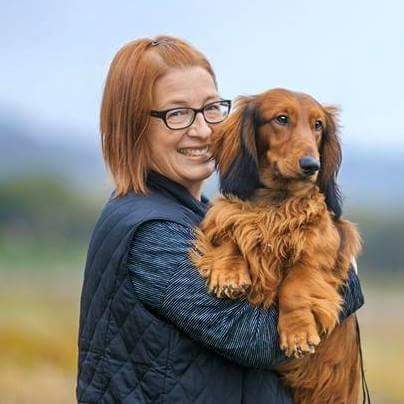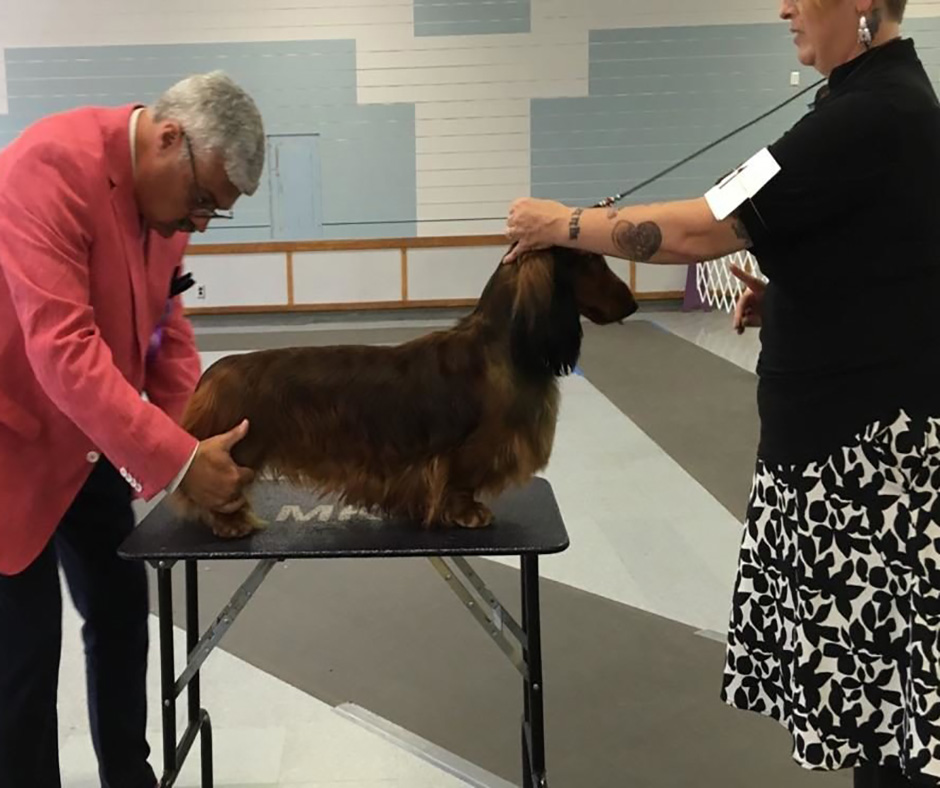201 – Exhibitor Education Courses Come Online
“Crowdsourcing” Knowledge for Exhibitor Education
Vicki Ronchette, author of “From Shy to Showy,” has created a new exhibitor education resource with online college-type classes available on a wide variety of topics.
New owners, exhibitors who want to improve their performance and experienced members of the fancy who want to hone their skills will all find a topic of interest.
“A lot of people don’t have access to training classes near them,” Ronchette said. “Or the classes are more socialization and don’t offer a lot of information for training the dog or the handler.”
Listeners who missed Ronchette’s previous podcasts, can check out some of her outstanding positive training tips here and here.
Variety of courses available
Show Dog Prep School Courses include everything from training nail trims, to using Tellington TTouch for better results, to Safe Travel with dogs.
Full disclosure, your host, Laura Reeves, is an instructor for SDPS. Her first offering is: Canine Structure 101 and Applying the Breed Standard.
Courses are available with coaching from instructor, as well as a mentoring program with Ronchette, webinars, forums and more. The school is designed to offer easy navigation and a user-friendly platform.
Learn on YOUR schedule
“In today’s society, people don’t have a lot of time,” Ronchette said. “Show Dog Prep School allows people to learn on their own schedule. Virtual education is really helpful for folks to learn and get up to speed when they are just getting started.”
Ronchette is dedicated to the positive reinforcement system of dog training. And she applies it to her students.
“Positive reinforcement for people is so important,” Ronchette said. “We are creating a community of helping and support.”
People AND animals deserve to have an education so they can go in to a dog show with confidence and actually enjoy the sport and stay with it, Ronchette noted.
“We can help you understand the reason a dog didn’t win. It could actually be that your dog didn’t look as good. Let’s work on that,” Ronchette said.
Don’t miss Allison Foley’s Tip of the Week from the Leading Edge Dog Show Academy. Allison brings us *boggling* information about how to do up a coated breed beautifully – without power! Seriously, water and a bristle brush. What? Check it out.
153 – Vicki Ronchette|Showdogs from Shy to Showy
Vicki Ronchette wrote her book about showdogs “From Shy to Showy” after the success she’d had with positive training for show dogs during her popular training seminars.
She recommends desensitization and counter-conditioning so that dogs learn to be comfortable and love the show ring.
“We want to shift (the dog’s) entire emotional state,” Ronchette said. “You can’t punish or force an animal into feeling better about something. Each dog has a trigger and we need to figure that out first.”
Ronchette uses principles of applied behavior analysis to consider a behavior’s “antecedent” and its “consequence” to determine what and how she needs to go about helping change the dog’s behavioral response.
Dogs who are actually fearful require a bit different approach, Ronchette said.
“Fearful dogs have an emotional response,” she added. “Some (dogs) don’t end up loving it, but we can get (most of them) to the point that we finish them.”
It’s important to note, Ronchette said, “If you have a dog that’s injured people, it’s not ok to take it out there and have a stranger touch it every week. A lot of dogs get more reactive and worse if they are forced into (an uncomfortable behavior) without going through a training protocol.”
As she discusses on the podcast in several “real life” case study situations, Ronchette strongly advises pulling a dog from competition until its fear/reactive issues are resolved.
“We have to have the dog’s “head,” Ronchette said. “He has to be emotionally stable and feel safe with us and trust us (in order to work through the issues).”
She advocates taking a dog’s age into consideration. For example, is it experiencing a relatively normal “teenage” fear period where the dogs don’t always process and think about situations clearly.
With all these factors in mind, she replicates the “trigger” of the dog’s fear or anxiety and then works through the process of counter conditioning such that when the dog is “triggered” it reacts happily and looks to her for a reward.
Learning a dog’s stress signals is an opportunity, Ronchette noted, to catch the issue at a low level of anxiety and allows the exhibitor to distract the dog by asking for other known behaviors.
She’s also a huge advocate of choice for dogs. “I don’t want to use food to trick a dog into doing something,” Ronchette said. “If he chooses to do something, I will reward with food, but I want to give the dog the opportunity to make a choice. The dog has to know they have control and can make (a scary situation) stop… choice is a very powerful piece.”
And always leave them wanting more. “A puppy’s first show is one day,” Ronchette advised. “I want to put them away while they’re still asking for more.”
LISTEN TO VICKI ROCHETTE ON PURE DOG TALK
Listen in today as Vicki and Laura discuss these and other excellent training solutions for show dogs, specific case studies and more.


